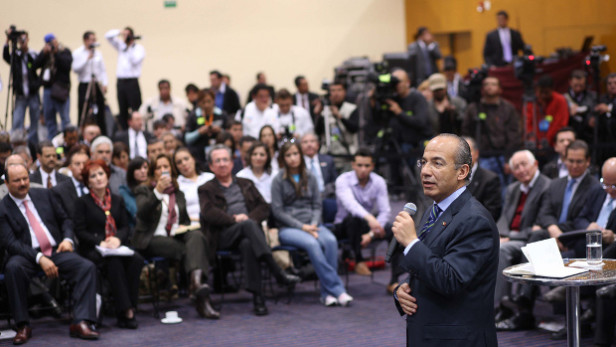 Mexican President Felipe Calderón holds a dialogue on Todos Somos Juarez, an initiative to take on the challenge of organized crime. It was launched in 2010 after the headline-grabbing murder of more than a dozen young people in Ciudad Juarez. Photo by: Alfredo Guerrero / Gobierno Federal / CC BY-NC-SA
Mexican President Felipe Calderón holds a dialogue on Todos Somos Juarez, an initiative to take on the challenge of organized crime. It was launched in 2010 after the headline-grabbing murder of more than a dozen young people in Ciudad Juarez. Photo by: Alfredo Guerrero / Gobierno Federal / CC BY-NC-SA
The room was filled with the expected crowd. In February 2010, only two weeks after the heinous killing of 16 youngsters in a public housing development in Ciudad Juarez, Mexico, government officials, businesspeople and activists gathered to hear then-President Felipe Calderon announce an important shift in his strategy to re-establish citizen security.
In the middle of the president’s speech, someone interrupted by raising his hand. Guillermo Asiain, a young man from Juarez, got the attention of the president, who invited him to take the stage.
“I’ve been listening to you and what I hear is that you want the ‘disadvantaged kids’ to cross the line back to the join the ‘good kids.’ But you’re attempting this without calling the good kids to help. We are the best positioned to help in this endeavor,” he said to all of us in the room.
Asiain was speaking on behalf of a large group of peers who were involved in community work in Juarez. His remarks energized the room and triggered an institutional response within Todos Somos Juarez, the violence prevention strategy launched that day, for which I was serving as a liaison to the social development ministry under the direct supervision of the president’s office and in collaboration with five federal agencies. This government support translated into technical assistance and financial funding to establish the Youth Organizations Network of Ciudad Juarez, which is today a network of 13 core youth organizations dedicated to serve disadvantaged and vulnerable groups and serves as a model for the rest of the country.
Fast forward five years to Doha, Qatar. This time, a smaller room was filled with 34 youths selected by the Qatar Foundation’s WISE Learner’s Initiative to spend a year rethinking education reform due to their accomplishments in their host countries. Also present were five midcareer Yale World Fellows, including me, who were there to mentor the learners.
See more stories from #YouthWill Lead Tomorrow:
● What young people need to lead
● What can development actors do to involve youth
● Investing in youth resilience
● What young people want from development implementers
● Youth involvement needs to mean something
● Arts in advocacy: How to touch minds and hearts for action and change
The young men and women I had the opportunity to mentor were not only full of bright ideas but firmly committed to making a difference for youths who do not have the advantages they do. From countries as disparate as Argentina and Egypt, they were thinking globally about challenges faced by youth in education, and had decided to focus their efforts to design school curricula to cultivate personality traits in children that have been empirically linked to success later on in life. To date, their project is in process of development and waiting for a workshop to refine their business model with the help of experts from Babson College and will be presented to decision-makers during the next Qatar Foundation’s education summit.
History is full of heroic accounts of youth fighting for social justice and the advancement of radical new ideas, and people often equate youth movements as grass-roots activism from “outside” systems and institutions. But as the experiences above show, young people can shake things up from within too.
The Youth Organizations Network of Ciudad Juarez and WISE Learners, whether shaping their governments policies or interacting with financial institutions like Banco Santander and academic institutions like Yale University, are working to influence formal institutions and systems by bringing the ideas and informed perspectives of youth to the table regarding the policy cycle. Both exemplify a smart kind of youth engagement that connects young people to formal institutions, from the community all the way up to the global level, and may yield great results if approached properly.
The international community should ask itself how to better leverage and replicate this type of initiative to get youths involved in systemic change at all levels. Too often youth is seen as a program beneficiary while they could play much more strategic roles. We could start with the obvious but often missing practice of deliberately including them in high-level discussions on policies that are affecting them, but other not so obvious steps could include earmarking funds to finance youth policy clusters through already established civil society organizations, or allowing youth to strategically participate in the design and operation of policy delivery mechanisms.
According to World Bank and United Nations figures, around 85 percent of global youth or approximately 1.3 billion live in developing countries. As the world becomes more urbanized, the impact inequality on future generations will become more important to address.
The challenges facing today’s youth require informed strategies and programs capable of being scaled up. For reasons that range from the technical and contextual to the financial, it makes sense to expand the engagement of those youth in which society has already successfully invested, like the WISE learners. Initiatives like Qatar Foundation’s are giving us a good example of how this multisectoral ensembles may be arranged to provide a platform to influence policy and drive systemic change.
Want to learn more? Check out the Youth Will website and tweet #YouthWill.
Youth Will is an online conversation hosted by Devex in partnership with Chemonics, The Commonwealth Secretariat, The MasterCard Foundation and UN-Habitat to explore the power that youth around the globe hold to change their own futures and those of their peers.

 https://s3.amazonaws.com/neo-assets/public/people/1054/86/Betancour..." width="76"/>
https://s3.amazonaws.com/neo-assets/public/people/1054/86/Betancour..." width="76"/>










